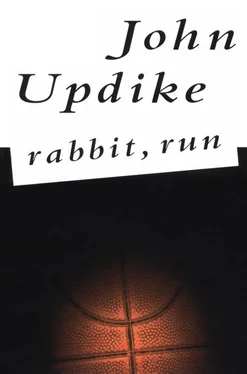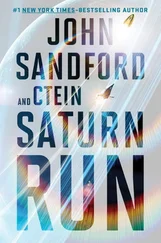He laughs again; but isn't she? "Well, uh, what does Mr. Angstrom think Harry should do?"
"Crawl back. What else? He will, too, poor boy. He's just like his father underneath. All soft heart. I suppose that's why men rule the world. They're all heart."
"That's an unusual view."
"Is it? It's what they keep telling you in church. Men are all heart and women are all body. I don't know who's supposed to have the brains. God, I suppose."
Eccles smiles, wondering if the Lutheran church gives everyone such ideas. Luther himself was a little like this, perhaps overstating half—truths in a kind of comic wrath. The whole black Protestant paradox—thumping maybe begins there. Helpless, predestined Man, the king of Creation. Utterly fallen: a hubris in shoving the particular aside. Maybe: he's forgotten most of the theology they made him absorb. It occurs to him that he should see the Angstroms' pastor.
Mrs. Angstrom picks up a dropped thread. "Now my daughter Miriam is as old as the hills and always was; I've never worried about her. I remember, on Sundays long ago when we'd walk out by the quarry Harold was so afraid —he wasn't more than twelve then – he was so afraid she'd fall over the edge. I knew she wouldn't. You watch her. She won't marry out of pity like poor Hassy and then have all the world jump on him for trying to get out."
"I'm not so sure the world has jumped on him. The girl's mother and I were just discussing that it seemed quite the contrary."
"Don't you think it. That girl gets no sympathy from me. She has everybody on her side from Eisenhower down. They'll talk him around. You'll talk him around. And there's another."
The front door has opened with a softness she alone hears. Her husband comes into the kitchen wearing a white shirt and a tie but with his fingernails outlined in black; he is a printer. He is as tall as his wife but seems shorter. His mouth works self—deprecatorily over badly fitted false teeth. His nose is Harry's, a neat smooth button. "How do you do, Father," he says; either he was raised as a Catholic or among Catholics.
"Mr. Angstrom, it's very nice to meet you." The man's hand has tough ridges but a soft, dry palm. "We've been discussing your son."
"I feel terrible about that." Eccles believes him. Earl Angstrom has a gray, ragged look. This business has blighted him. He thins his lips across his slipping teeth like a man with stomach trouble biting back gas. He is being nibbled from within. Color has washed from his hair and eyes like cheap ink. A straight man, who has measured his life with the pica—stick and locked the forms tight, he has returned in the morning and found the type scrambled.
"He goes on and on about the girl as if she was the mother of Christ," Mrs. Angstrom says.
"That's not true," Angstrom says mildly, and sits down in his white shirt at the porcelain kitchen table. Four settings, year after year, have worn black blurs through the enamel. "I just don't see how Harry could make such a mess. He wasn't like other boys, sloppy. He was a tidy worker."
With raw sudsy hands Mrs. Angstrom has set about heating coffee for her husband. This small act of service seems to bring her into harmony with him; they begin, in the sudden way of old couples apparently at odds, to speak as one. "It was the Army," she says. "When he came back from Texas he was a different boy."
"He didn't want to come into the shop," Angstrom says. "He didn't want to go into a dirty trade."
"Reverend Eccles, would you like some coffee?" Mrs. Angstrom asks.
At last, his chance. "No, thank you. What I would love, though, is a glass of water."
"Just water? With ice?"
"Any way. Any way would be lovely."
"Yes, Earl is right," she says. "People now say how lazy Hassy is, but he's not. He never was. When you'd be proud of his basketball in high school you know, people would say, `Yes well but he's so tall, it's easy for him.' But they didn't know how he had worked at that. Out back every evening banging the ball way past dark; you wondered how he could see."
"From about twelve years old on," Angstrom says, "he was at that night and day. I put a pole up for him out back; the garage wasn't high enough."
"When he set his mind to something," Mrs. Angstrom says, "there was no stopping him." She yanks powerfully at the lever of the ice—cube tray and with a brilliant multiple crunch that sends chips sparkling the cubes come loose. "He wanted to be best at that and I honestly believe he was."
"I know what you mean," Eccles says. "I play a little golf with him and already he's become better than I am."
She puts the cubes in a glass and holds the glass under a spigot and brings it to him. He tilts it at his lips and Earl Angstrom's palely vehement voice wavers through the liquid. "Then he comes back from the Army and all he cares about is chasing ass."
"Your language, Earl," his wife says, setting coffee in a flowered cup on the table between his hands.
He looks down into the steam and says, "Excuse me. When I think of what that boy's doing my stomach does somersaults. He's become the worst kind of Brewer bum. If I could get my loving hands on him, Father, I'd try to thrash him if he killed me in the process." His ashen face bunches defiantly at the mouth; his colorless eyes swarm with glitter.
Eccles says "No" into his tilted glass like a megaphone and then drinks until no more water can be sucked from under the ice cubes that bump his upper lip. He wipes the moisture from his mouth and says, "There's a great deal of goodness in your son. When I'm with him – it's rather unfortunate, really – I feel so cheerful I quite forget what the point of my seeing him is." He laughs, first at Mr., and, failing here to rouse a smile, at Mrs.
"This golf you play," Angstrom says. "What is the point? In my opinion a good swift kick is what he needs. The girl's parents should call in the Brewer police, him living in sin with a tart like that."
Eccles glances toward Mrs. Angstrom and feels the arch of his eyebrows like drying paste on his forehead. He didn't expect, a minute ago, to be looking toward her as an ally and toward this worn—out good man as a rather vulgar and disappointing foe.
"Don't talk nonsense, Earl," Mrs. Angstrom says. "What does Springer want with his name in the papers? The way you talk you'd think poor Harry was your enemy."
"He is my enemy," Angstrom says. He touches the saucer from both sides with his stained fingertips. "That night I spent walking the streets looking for him he became my enemy. You can't talk. You didn't see the girl's face."
"What do I care about her face? You talk about tarts: they don't become ivory—white saints in my book just by having a marriage license. That girl wanted Harry and got him with the only trick she knew and now she's run out of tricks."
"Don't talk that way, Mary. It's just words with you. Suppose I had acted the way Harry has."
"Ah," she says, and turns, and Eccles flinches, seeing her face taut to release a missile. "I didn't want you; you wanted me. Or wasn't it that way?"
"Yes of course it was that way," Angstrom mutters.
"Well then: where's the comparison?"
Angstrom has hunched his shoulders over the coffee, drawn himself in very small, as if she has boxed him into a tiny corner. "Oh Mary," he sighs, not daring move with words.
Eccles tries to defend him; he goes to the weaker side of a fight almost automatically. "I don't think you can say," he tells Mrs. Angstrom, "that Janice didn't imagine that her marriage was built on mutual attraction. If the girl was such a clever schemer she wouldn't have let Harry slip away so easily."
Mrs. Angstrom's interest in this discussion, now that she knows she pressed her husband too hard, has waned; she maintains a position – that Janice is in control – so obviously false that it amounts to a concession. "She hasn't let him slip away," she says. "She'll have him back, you watch."
Читать дальше












